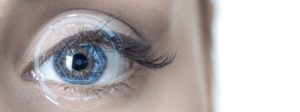
Studies have shown that the ultraviolet radiation in sunlight can cause damage not only to the skin but also to the eyes. This damage accumulates over years, too, so any amount of time that is spent outdoors without adequate eye protection can have an impact that doesn’t show up until years later.
UV Radiation and the Aging Eye
The eyes go through physiological changes over time, which can alter the clarity of vision and also present risks for eye diseases like glaucoma and age-related macular degeneration. The ultraviolet light in sunshine carries both UVA and UVB radiation. These are the same rays of light that age the skin and cause sunspots. UV light is more powerful than visible light, which means it can damage the eyes without warning. The effects of long-term exposure may show up in the form of cataracts, a condition in which the lens of one or both eyes become cloudy.
Wearing sunglasses even on cloudy days diminishes the risk of UV damage by blocking out these invisible rays of light.
Darker May Not be Better
Some people assume that the best protection from UV light will be obtained with darker sunglass lenses. According to one expert, this may not be the case. When a person wears darker lenses, their pupil may be forced to open more widely. Ultimately, this could allow more light into the eye than a moderately shaded lens. Also, ultraviolet light is not affected by lens color, only by UV filters made into the frame.
Wearing Sunglasses After Cataract Surgery
Patients who visit our Amarillo office for cataract removal often ask if they have wear sunglasses after their procedure. We appreciate this question because it should not be assumed that sunglasses are no longer an important matter. In truth, the ultraviolet rays in sunlight can still damage the macula, the center of the retina after synthetic lenses have been inserted to replace a clouded lens.
Sunglass use is one of the best ways to decrease the risk of cataract formation and slow the progression of developing cataracts. For more information on cataract removal, call (806) 351-1177.
